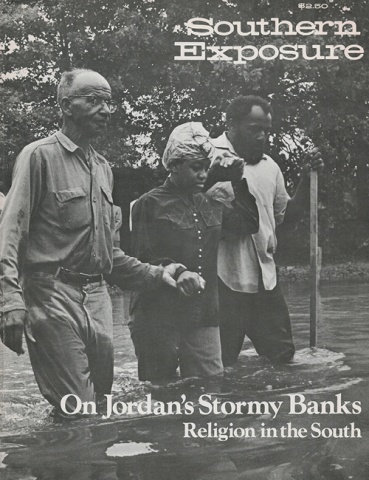
This article originally appeared in Southern Exposure Vol. 4 No. 3, "On Jordan's Stormy Banks: Religion in the South." Find more from that issue here.
To understand the Southern movement for social and political justice, it is necessary to understand the black church. Throughout the civil rights movement of the '50s and '60s, it served as the nurturing institution for the new mass movement. Its structures were used for meetings, freedom schools, voter registration drives and community centers. Its members were often the foundation upon which local movements were built and sustained.
Nor is it a recent phenomenon. Since the time black people were brought to this country under slavery, the church has been the one institution they have controlled and used as a tool for their own liberation. W.E.B. DuBois, writing in The Souls of Black Folk described a "First Baptist" congregation in Virginia during the post-reconstruction period: "Various organizations met here — the church proper, the Sunday school, two or three insurance societies, women's societies, secret societies, and mass meetings of different kinds. Entertainments, suppers, and lectures 3re held beside the five or six regular religious services. Considerable sums of money are collected and expended here, employment is disseminated and charity distributed. At the same time, this social, intellectual, and economic centre is a religious centre of great power."
In the following pages, three ministers talk about the vitality of the black religious experience. One theme emerges again and again: That the black religious experience is based on the "totality" of life, the melding of the physical and the spiritual in a way that has forged an institutional expression altogether different than its white counterpart. It has been a place where the political and social needs of the community could find collective expression and where the persona! anguish of an earthly existence could find spiritual release, a place where personhood was affirmed rather than denied, where hope and faith in the future found solid expression in the here and now.
Tags
Jim Sessions
Sue Thrasher
Sue Thrasher is coordinator for residential education at Highlander Center in New Market, Tennessee. She is a co-founder and member of the board of directors of the Institute for Southern Studies. (1984)
Sue Thrasher works for the Highlander Research and Education Center. She is a former staff member of Southern Exposure. (1981)

